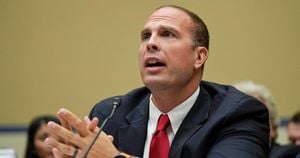The upcoming Nova Scotia provincial election is shaping up to be both pivotal and contentious, as key issues like health care, housing, and affordability take center stage. With the election scheduled for later this month, the atmosphere is charged with debate and promises from the leaders of the major parties, each aiming to sway voters with their visions for the province's future.
On November 14, 2024, party leaders from the Progressive Conservative (PC), Liberal, and New Democratic (NDP) parties squared off during their first televised debate, offering voters insight not just on their platforms but on how they perceive each other's track records. The debate revealed stark contrasts between the incumbent PC government under Premier Tim Houston, the Liberal opposition led by Zach Churchill, and NDP leader Claudia Chender.
Viewers of the debate witnessed Houston touting the successes of his government, which he claims have included significant strides toward improving health care and increasing the availability of housing. His supporters argue Houston's administration has made meaningful changes, stating, "Over the last three and a half years, Tim Houston and his team have made great strides in improving health care, making life more affordable and building more homes," according to Tara Miller, the co-chairwoman of the PC campaign.
Challenging this narrative, Chender was quick to highlight the shortcomings of the PC government. She pointed out issues such as health care accessibility and skyrocketing rent prices, stating, "Under the PC government, rent increased by 70 percent and 145,000 Nova Scotians still don’t have primary care they can rely on." Her party aims to prioritize protecting renters and ensuring affordable housing, alongside promises to eliminate taxes on essentials such as groceries.
The debate's lively exchanges highlighted how the candidates jockey for position, but as political experts suggest, the effectiveness of debates may be diminishing. Lori Turnbull, a professor at Dalhousie University, explained, "Viewership of debates has gone down as people have wider sources of political news, including social media. Even if people watch, performances tend to solidify existing opinions." This viewpoint suggests the upcoming election may not hinge solely on these televised confrontations.
Healthcare issues were at the forefront of the debate, largely influenced by the widespread discontent with the current healthcare system. All three major parties have made promises to improve access to health services, with the Tories committing to create specialized clinics, including one for menopause, which exemplifies their more focused strategy on women's health care. The NDP, on the other hand, presented their approach as more inclusive and community-centered, emphasizing collaborative care services, demonstrating their intent to connect primary care with broader health initiatives.
Meanwhile, the Liberal Party positioned itself as the alternative to both the PC and NDP, outlining aggressive plans for tax reforms focused on the middle class. Churchill claimed this approach would alleviate financial burdens, stating, "We will no longer be the highest taxed province in the country... we’ll build more homes for people who need them, so young people know they can afford to settle here." These assertions could resonate with voters frustrated by high living costs.
This tense atmosphere extends beyond the debate stage. The current campaign has also seen controversies flare up, including allegations of unethical campaign practices among the Tories relating to vote-buying, which may affect public perception. Such incidents could fuel voter skepticism, especially following the claims from Houston's camp directed at his opponents for their past governance, which they argue contributed to the issues currently plaguing Nova Scotia.
Chender's NDP platform outlines concrete actions, including proposals to increase affordable housing and improve care access for all, indicating they’re ready to cater to the urgent needs of constituents. The NDP leader emphasized the importance of trustworthy governance for Nova Scotians: “We need homes we can afford, healthcare we can rely on, and cost of living solutions,” she stated. This rhetoric could be particularly appealing to voters feeling left out of the economic recovery.
Adding to the complexity, this election is taking place under the shadow of broader socioeconomic challenges, including rising costs of living and the effects of climate change on coastal communities. These issues have increasingly become focal points, with rural areas particularly concerned about the reliability of services such as cell coverage and access to healthcare.
Regular citizens also seek answers to pressing issues like these, as many are more concerned about practical day-to-day challenges than the bigger political battles at play. Rural communities are already vocalizing their desire for reliable cellular coverage to be prioritized on candidates' agendas. Many locals argue this technological gap is indicative of larger systemic shortcomings within government policies.
Overall, the voices of Nova Scotians—whether from urban centers or rural locales—echo the urgent call for change and accessible solutions. The way forward seems to depend not just on the political promises made during this election but also on how effectively these leaders can connect with voters and their real-life experiences. The tense, engaging atmosphere surrounding this election hints at the significance of these elections, as voters weigh their options carefully amid promises made under the bright lights of televised debates.
With election day looming, all eyes will remain on how candidates respond to the challenges laid out before them and how they plan to bridge the gap between promises and the needs of their constituents. The outcome of the Nova Scotia provincial election could shape the future policies addressing not only healthcare and housing but also economic stability and reliability of services for years to come.



